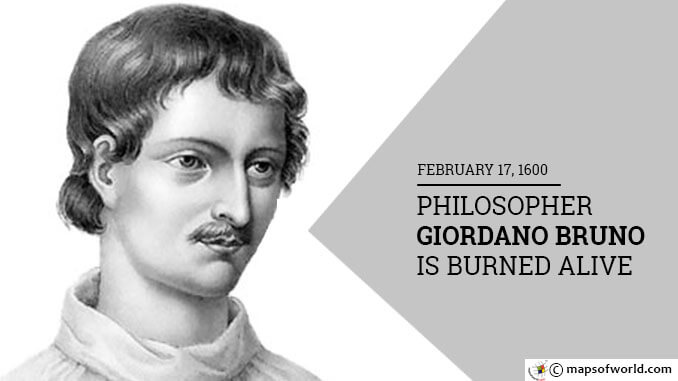On February 17, 1600, Giordano Bruno, the Italian philosopher, occultist, and mathematician, was burnt at the stake on charges of heresy and blasphemy. Many of his teachings anticipated modern science. Bruno was among the earliest astronomers and mathematicians who spoke of the multiplicity of worlds and defined the universe as infinite. Giordano Bruno was born in 1548 at Nola near Naples. His father, Giovanni Bruno, was a soldier, and his mother was Fraulissa Savolino. Young Bruno was sent to Naples to study humanities, logic, and dialectics in 1562. Three years later he entered the Dominican convent of San Domenico Maggiore and became a priest in 1572. His natural affinity to natural magic and works of Giovanni Battista Della Porta, Hermes Trismegistus, and Plato, drew him the attention of the Inquisition in Naples. In 1576 Bruno fled the city to escape prosecution. He first went to Naples, then to Toulouse and finally in 1581 reached Paris. Here under the protection of Henry III, Bruno taught and wrote some of his influential work on epistemology. By 1583 Bruno was ready to move to London and left with an introductory letter from Henry III. He started to teach at Oxford but incurred the wrath of the Oxonians for his support of Copernican theories of the Universe. Bruno had a particular knack of making enemies wherever he went. Owing in great measure to his works which propounded startling, hitherto unheard of (in the west) theories, Bruno could not lead a peaceful life in any of the countries he visited. Some of his best works were written in England. Cena de le Ceneri (1584; The Ash Wednesday Supper), De la causa, principio e uno (1584; Concerning the Cause, Principle, and One), De l’infinito universo e mondi (1584; On the Infinite Universe and Worlds), Cabala del cavallo Pegaseo (1585; Cabal of the Horse Pegasus), and De gli eroici furori (1585; The Heroic Frenzies) – all written and published between a short period of time propounded an entirely new view of cosmetology and metaphysics. Bruno maintained that form and matter were intimately related and could be considered in their unity. There exist several worlds in an infinite universe and many of these could harbor intelligent life. The relationship between the individual soul and the infinite soul ends in the emergence of the Universal soul as the sole reality. His views brought Bruno to the mercy of rigid opposition wherever he went. He returned to Paris in 1585 but the political atmosphere there was no longer welcome. Bruno spent the next five years wandering through many parts of France and Germany, lecturing at many educational and religious institutions and engaging in bitter intellectual debates with renowned figures. In 1591, Bruno once again moved to Frankfurt, possibly to attend the Frankfurt Book, Fair where he met Giovanni Mocenigo, Venetian patrician. Mocenigo wished to learn more about the art of memory and Bruno wanted to apply for a vacant chair in mathematics at the University of Padua. The move seemed sensible at the time as Venice was considered a liberal state. Though he did teach at Padua, Bruno was unsuccessful in his attempts at securing the chair for mathematics and moved to Venice to instruct Mocenigo the following year. Mocenigo was unhappy with Bruno and the both had entered into a conflict, following which Mocenigo denounced his tutor to the Venetian Inquisition. Bruno was arrested in May that year. Bruno’s trial in Rome lasted seven long years through which he was imprisoned and interrogated regularly. He was charged with heresy, anti-Catholic teachings. Blasphemy, and dealing in divination and other magical ways. During this period, Bruno initially defended himself on the grounds that his philosophy was not incompatible with the theological doctrines of Catholicism and admitting minor errors. When the inquisitors demanded a complete retraction of his study and teachings, Bruno initially agreed but after years of repeated attempts at indoctrination, he refused to issue a formal abjuration. During this period, he was incarcerated at many prisons including the one at Sant’Uffizio and in the Tower of Nona. At last he was sentenced to death in 1600. Upon hearing of his death proclamation Bruno is believed to have said, “Perhaps your fear in passing judgment on me is greater than mine in receiving it.” On February 17, Giordano Bruno was brought to the Campo de’ Fiori, a market square in central Rome and burned at the stake. He was gagged during his last hours to prevent him from making a final inflammatory speech. His ashes deemed impure and were thrown into River Tiber. Bruno remains one of the greatest symbols of liberal western philosophy and a great anticipator of the scientific revolution that would soon sweep the world. Many western philosophers borrowed and built upon his concept of freedom of thought in the centuries to come. You may also like : February 17 1819 – The First Missouri Compromise Passes the United States House of Representatives
February 17 1600 – Philosopher Giordano Bruno is burned alive
On February 17, 1600, Giordano Bruno, the Italian philosopher, occultist, and mathematician, was burnt at the stake on charges of heresy and blasphemy. Many of his teachings anticipated modern science.…
954
